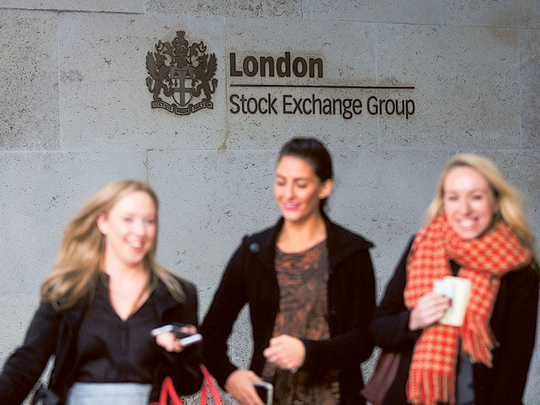
London: The prospect of a messy divorce between the UK and the European Union threatens to overwhelm support for nation’s bonds from the Bank of England’s asset purchases.
Gilts have been the worst performers in the developed world this month as a sliding currency pushed investors’ expectations for consumer-price growth to a more than two-year high. Still, with the BOE having committed in August to buying £60 billion ($73 billion) of bonds over six months, that move pales in comparison to the currency’s 18 per cent drop since Brexit.
Despite the BOE’s support, the danger signs for gilts are mounting. Bets that inflation may stay the central bank’s hand have seen traders remove wagers on interest-rate cuts all the way through 2017. On top of that, should Prime Minister Theresa May’s government purse a departure from the EU that deprives the country of tariff-free access to the single market, it may create an even more toxic environment for bonds, boosting prices for domestic producers while hurting exporters’ prospects.
With the government eyeing fiscal stimulus to support growth, a dramatic increase in funding costs may ultimately prove a more serious problem than the currency’s weakness.
“UK government bonds are among the most vulnerable assets,” said Alberto Gallo, London-based head of macro strategies at Algebris Investments LLP, which oversees $5.2 billion. “They are at these levels because the BOE is still buying them, but that’s an artificial level. With sterling declining more and more, the BOE will be under pressure from inflation.” Algebris has a short position on gilts, Gallo said, meaning a bet the assets will decline.
The yield on UK 10-year gilts rose 13 basis points, or 0.13 percentage point, this week, adding to a 22 basis-point increase in the previous five days. It jumped to 1.15 per cent on Friday, the highest since the June 23 referendum. Yields touched a record-low 0.5 per cent in August, and were as high as 1.99 per cent on the last day of 2015.
Gilts lost 2.3 per cent in October through Thursday, the biggest decline among sovereign markets tracked by the Bloomberg World Bond Indexes.
“I get the sense that the market has got fairly numb to these kind of gilt moves over the last few months” said Mike Riddell, a London-based debt-fund manager at Allianz Global Investors, which oversees about $520 billion. “Most people are attributing it to a lower pound and therefore higher inflation, which I think is only partly true. Sterling and gilts have been hit hard by Theresa May’s comments on the likelihood of ‘hard Brexit’ and the lack of visibility that this brings, plus the prospect of more fiscal stimulus.”
It’s a fall from grace for a market that investors looked to as a haven during the euro-area’s sovereign debt crisis. Back then, investors were attracted by the UK’s relative political and economic calm at a time when concern that its neighbours’ debt loads had reached unsustainable levels was bringing into question the existence of the euro, toppling governments and forcing some countries to seek bailouts.
Now it’s the UK standing out for the wrong reasons, with the pound’s decline making headlines and filtering through to the real economy in the form of disputes between supermarkets and suppliers. Sterling’s slide versus the dollar since the June 23 vote is also threatening to erode the value of the fixed returns on the nation’s bonds, particular for international investors.
In addition to the inflation outlook, doubts about BOE Governor Mark Carney’s ability to extend quantitative easing were reinforced at the Conservative Party conference, where Prime Minister Theresa May said ultra-loose monetary policies helped to widen inequality. The central bank has been buying gilts since August, with initial concerns over potential scarcity fading as the outlook for inflation picked up.
“If you look at break-even rates, they’ve already jumped quite a bit,” said Vatsala Datta, a rates strategist at Royal Bank of Canada in London. “One of the factors is doubts about how prominent QE is going to be. If the market expects that QE is not going to be the main policy tool and the baton is going to be picked up by fiscal policy, then technically you’d have one of the buyers of nominal gilts out of the market.”












